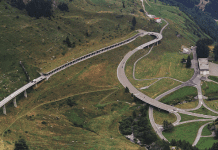One thing that we are starting to run out of is land. With developers fighting over every scrap and more new homes or commercial properties being built every year, land is an attractive proposition and also a beautiful thing to own. Some investors choose to operate as a business treating land as an asset, while others look to purchase land for business opportunities such as farming or recreational uses.
There are several types of land investment which can either make a short term return of investment or grow in value over a number of years. Residential and commercial land investments are excellent entry-level because they are highly sought after and will help you to see a reasonable swift return. However, this also makes them a little harder to get hold of at a reasonable price. This is where networking with landowners might help you to get ahead. It’s a matter of who you know, not just what you know. You won’t be able to enjoy owning the land. This is purely business and is traded like any other asset. There are lots of networking events for landowners, and you can find these on social media sites like LinkedIn or Facebook. Speaking to current landowners and getting to know them at regular meetings could give you access to great deals and private arrangements.
Land for livestock operations will give you the ability to generate an income from your land, in the same way, buying to rent brings you some cash flow. Essentially you buy the land and farm it yourself. Whether this is cattle or for growing cotton or corn. There are quite large upfront financial outlays for this, however, and there are also fixed costs involved in farming. You also have to understand all of the regulations that are involved in the farming industry and be willing to work really hard for cash flow and a return on your investment. This may not be a good option for someone that already has an extensive portfolio or multiple businesses. Another option is to buy and lease the land out to an established farmer. Someone who will pay you rent to farm your land. This could benefit you in various ways and lifts the daily management of any livestock or row-crop farming. There are multiple risks involved, particularly if you have no experience of livestock or row-crop farming, and it may also cause you potential issues if the leaseholder cannot pay their rent. Tying you up in complicated eviction processes.
One of the most attractive land investments for newcomers to the sector is small farm investment. This includes mineral development lands, vineyards and recreational spaces. This is quite popular in countries like Australia where people buy land then give a lease to
opal hunters or gold hunters. They pay money to be able to find minerals and then keep all the profits from the products they find on the land. It gives investors an income stream and the ability to take the enjoyment out of the land that they own.
Woodland offers a reasonable risk/return profile and a host of other attractive benefits. It is also beneficial for anyone who is looking to be more ecologically and socially responsible. Woodland has a carbon-neutral footprint and is a way you could improve habitats and biodiversity, which makes it very attractive to anyone looking to increase the sustainability of their investment portfolio. Woodland valuation is quite specific, so you do need to talk to an expert.
There are lots of legalities when it comes to land and the purchase of raw land, especially if you have ideas of development opportunities. You could encounter land-use restrictions, mineral rights, conveyance or land easements. This means that while you own the land, someone else owns the right to mine the minerals or utilise the land. This could result in you being a landlord while someone else makes all the money from your land. So you need to be sure of any contracts or restrictions before you make your investment. You need to find the legal specification for your land. You can usually obtain this on the internet where land deeds are available to the public. Or you could go to the deeds division of the county clerk, and they will be able to show you any potential issues that you may encounter.
It can be hard to predict land valuation on a raw-land purchase, and it’s important to remember that this type of investment isn’t going to generate you an income. It is undeveloped, and you will only see a return on investment once the land is sold. It is also essential that investors who by small-farm land realise this can be a risky business venture. You could be subject to crop disease or pest infections, and the weather can affect the production and market prices of your produce are subject to change. You also need to have the time to commit to running your small farm venture. The good life can seem like a dream come true, but the reality is it’s an incredibly hard way of life.
There is a high risk in land investment, and it certainly isn’t for the faint-hearted. However, it is an exhilarating prospect if you are playing with risk capital, and you aren’t afraid of hard work. There is potential for innovative and creative strategies. If you are a business owner, you could utilise the land to help create a more sustainable business. There are ways you could use your land for renewable energy sources which could help you promote your business and show that you are acting on the commitments to reduce global warming. It is also a worthwhile long term investment for your children. If you are looking to leave them a legacy, then you could create a fantastic future for them by investing in the land which will grow in value as developers start to pay higher prices when land is scarce.









































